BIZ102 - Emotional Intelligence Reflection for Professional Practice
VerifiedAdded on 2022/09/22
|6
|910
|27
Report
AI Summary
This report presents a student's reflection on their emotional intelligence (EI) assessment, conducted using Daniel Goleman's EQ test. The student received a score of 45, indicating strengths in self-management, self-awareness, and relationship management, but a need for improvement in social awareness. The report details the student's self-perceived strengths and weaknesses based on the assessment, highlighting the importance of feedback and interaction competencies. The student identifies strategies to improve social awareness, such as regular feedback assessment, and emphasizes the importance of relationship management in professional practice. The report references key sources to support the analysis and provide context for the student's reflections.
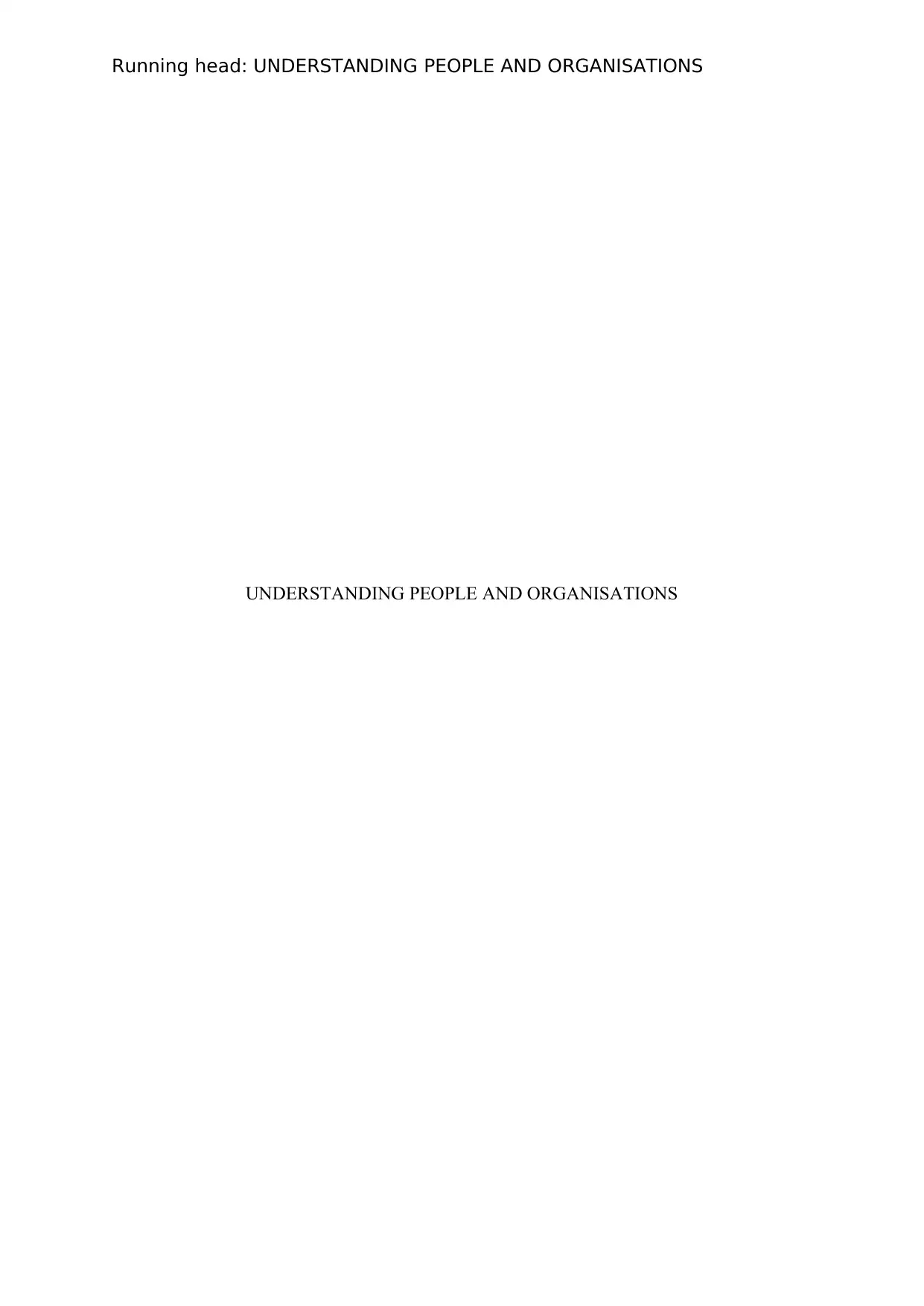
Running head: UNDERSTANDING PEOPLE AND ORGANISATIONS
UNDERSTANDING PEOPLE AND ORGANISATIONS
UNDERSTANDING PEOPLE AND ORGANISATIONS
Paraphrase This Document
Need a fresh take? Get an instant paraphrase of this document with our AI Paraphraser
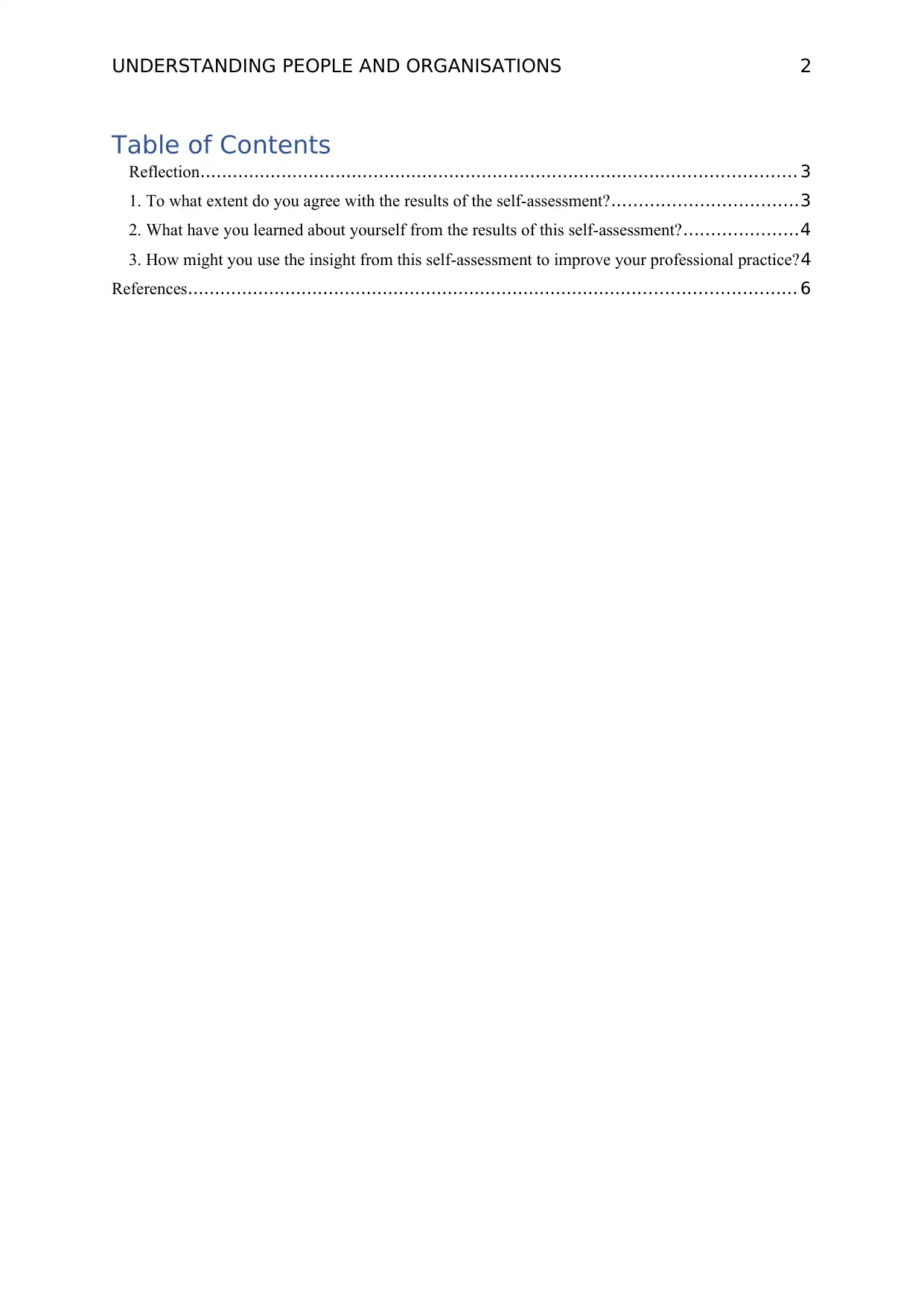
UNDERSTANDING PEOPLE AND ORGANISATIONS 2
Table of Contents
Reflection.............................................................................................................. 3
1. To what extent do you agree with the results of the self-assessment?..................................3
2. What have you learned about yourself from the results of this self-assessment?.....................4
3. How might you use the insight from this self-assessment to improve your professional practice?4
References................................................................................................................ 6
Table of Contents
Reflection.............................................................................................................. 3
1. To what extent do you agree with the results of the self-assessment?..................................3
2. What have you learned about yourself from the results of this self-assessment?.....................4
3. How might you use the insight from this self-assessment to improve your professional practice?4
References................................................................................................................ 6
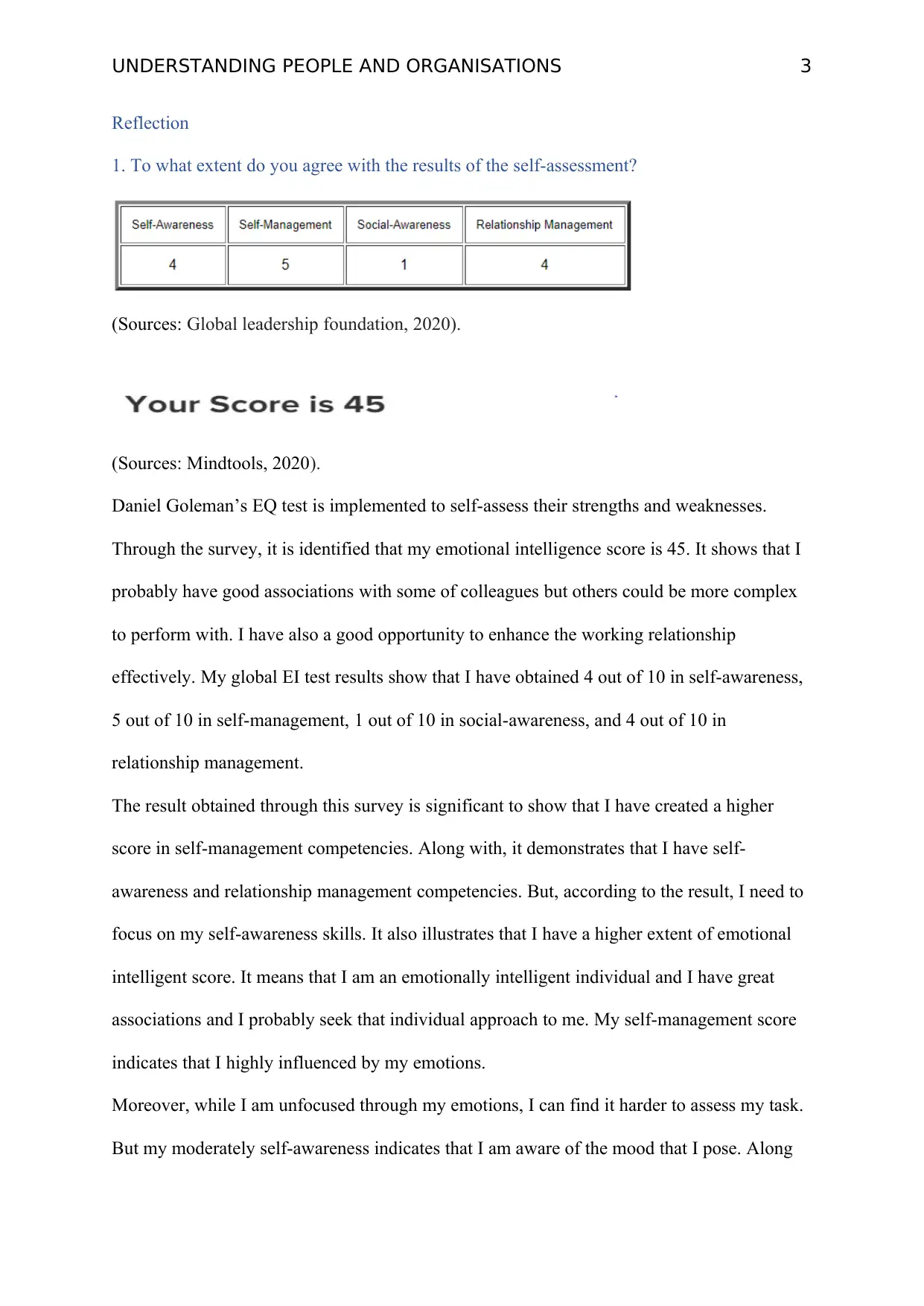
UNDERSTANDING PEOPLE AND ORGANISATIONS 3
Reflection
1. To what extent do you agree with the results of the self-assessment?
(Sources: Global leadership foundation, 2020).
(Sources: Mindtools, 2020).
Daniel Goleman’s EQ test is implemented to self-assess their strengths and weaknesses.
Through the survey, it is identified that my emotional intelligence score is 45. It shows that I
probably have good associations with some of colleagues but others could be more complex
to perform with. I have also a good opportunity to enhance the working relationship
effectively. My global EI test results show that I have obtained 4 out of 10 in self-awareness,
5 out of 10 in self-management, 1 out of 10 in social-awareness, and 4 out of 10 in
relationship management.
The result obtained through this survey is significant to show that I have created a higher
score in self-management competencies. Along with, it demonstrates that I have self-
awareness and relationship management competencies. But, according to the result, I need to
focus on my self-awareness skills. It also illustrates that I have a higher extent of emotional
intelligent score. It means that I am an emotionally intelligent individual and I have great
associations and I probably seek that individual approach to me. My self-management score
indicates that I highly influenced by my emotions.
Moreover, while I am unfocused through my emotions, I can find it harder to assess my task.
But my moderately self-awareness indicates that I am aware of the mood that I pose. Along
Reflection
1. To what extent do you agree with the results of the self-assessment?
(Sources: Global leadership foundation, 2020).
(Sources: Mindtools, 2020).
Daniel Goleman’s EQ test is implemented to self-assess their strengths and weaknesses.
Through the survey, it is identified that my emotional intelligence score is 45. It shows that I
probably have good associations with some of colleagues but others could be more complex
to perform with. I have also a good opportunity to enhance the working relationship
effectively. My global EI test results show that I have obtained 4 out of 10 in self-awareness,
5 out of 10 in self-management, 1 out of 10 in social-awareness, and 4 out of 10 in
relationship management.
The result obtained through this survey is significant to show that I have created a higher
score in self-management competencies. Along with, it demonstrates that I have self-
awareness and relationship management competencies. But, according to the result, I need to
focus on my self-awareness skills. It also illustrates that I have a higher extent of emotional
intelligent score. It means that I am an emotionally intelligent individual and I have great
associations and I probably seek that individual approach to me. My self-management score
indicates that I highly influenced by my emotions.
Moreover, while I am unfocused through my emotions, I can find it harder to assess my task.
But my moderately self-awareness indicates that I am aware of the mood that I pose. Along
⊘ This is a preview!⊘
Do you want full access?
Subscribe today to unlock all pages.

Trusted by 1+ million students worldwide
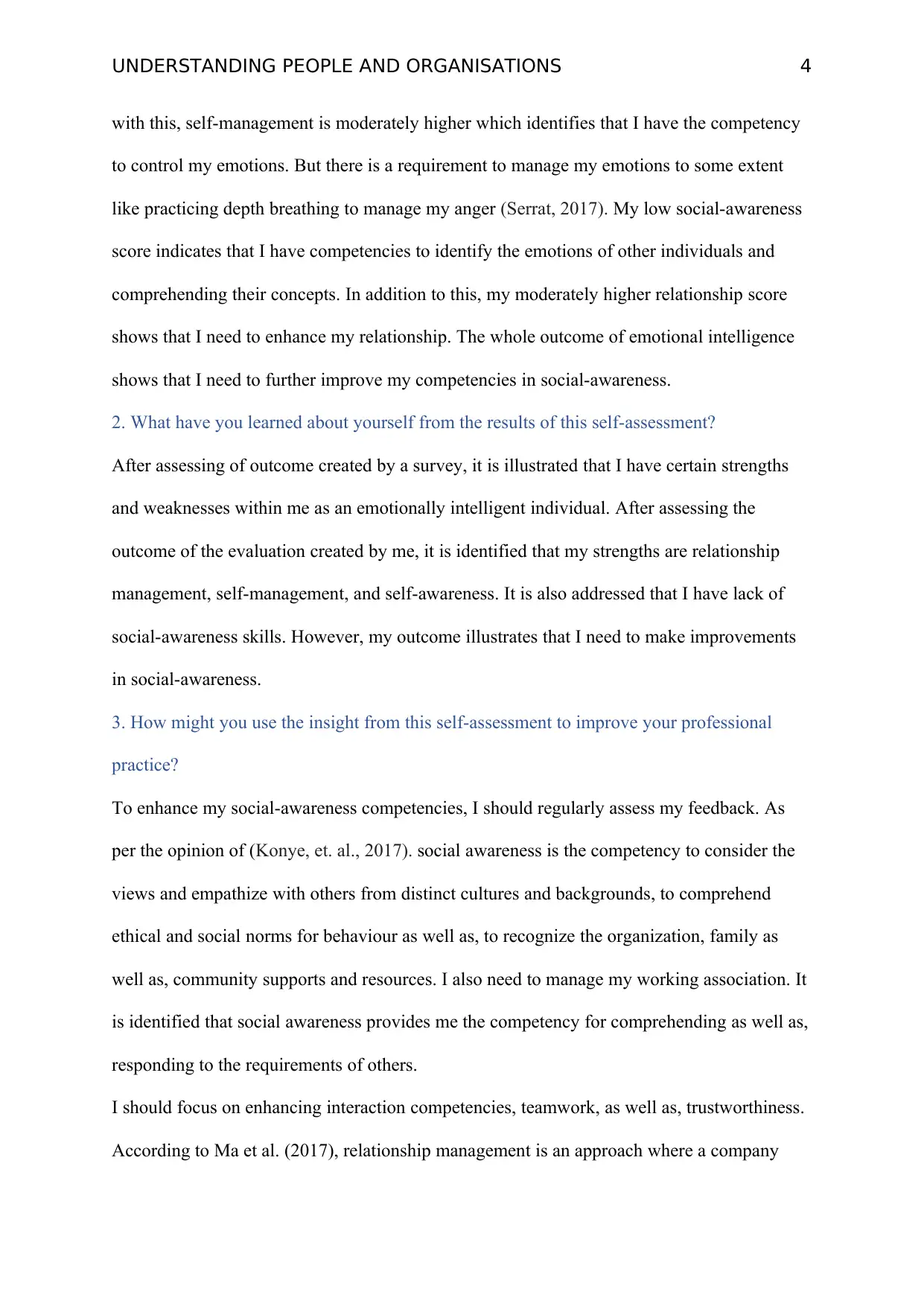
UNDERSTANDING PEOPLE AND ORGANISATIONS 4
with this, self-management is moderately higher which identifies that I have the competency
to control my emotions. But there is a requirement to manage my emotions to some extent
like practicing depth breathing to manage my anger (Serrat, 2017). My low social-awareness
score indicates that I have competencies to identify the emotions of other individuals and
comprehending their concepts. In addition to this, my moderately higher relationship score
shows that I need to enhance my relationship. The whole outcome of emotional intelligence
shows that I need to further improve my competencies in social-awareness.
2. What have you learned about yourself from the results of this self-assessment?
After assessing of outcome created by a survey, it is illustrated that I have certain strengths
and weaknesses within me as an emotionally intelligent individual. After assessing the
outcome of the evaluation created by me, it is identified that my strengths are relationship
management, self-management, and self-awareness. It is also addressed that I have lack of
social-awareness skills. However, my outcome illustrates that I need to make improvements
in social-awareness.
3. How might you use the insight from this self-assessment to improve your professional
practice?
To enhance my social-awareness competencies, I should regularly assess my feedback. As
per the opinion of (Konye, et. al., 2017). social awareness is the competency to consider the
views and empathize with others from distinct cultures and backgrounds, to comprehend
ethical and social norms for behaviour as well as, to recognize the organization, family as
well as, community supports and resources. I also need to manage my working association. It
is identified that social awareness provides me the competency for comprehending as well as,
responding to the requirements of others.
I should focus on enhancing interaction competencies, teamwork, as well as, trustworthiness.
According to Ma et al. (2017), relationship management is an approach where a company
with this, self-management is moderately higher which identifies that I have the competency
to control my emotions. But there is a requirement to manage my emotions to some extent
like practicing depth breathing to manage my anger (Serrat, 2017). My low social-awareness
score indicates that I have competencies to identify the emotions of other individuals and
comprehending their concepts. In addition to this, my moderately higher relationship score
shows that I need to enhance my relationship. The whole outcome of emotional intelligence
shows that I need to further improve my competencies in social-awareness.
2. What have you learned about yourself from the results of this self-assessment?
After assessing of outcome created by a survey, it is illustrated that I have certain strengths
and weaknesses within me as an emotionally intelligent individual. After assessing the
outcome of the evaluation created by me, it is identified that my strengths are relationship
management, self-management, and self-awareness. It is also addressed that I have lack of
social-awareness skills. However, my outcome illustrates that I need to make improvements
in social-awareness.
3. How might you use the insight from this self-assessment to improve your professional
practice?
To enhance my social-awareness competencies, I should regularly assess my feedback. As
per the opinion of (Konye, et. al., 2017). social awareness is the competency to consider the
views and empathize with others from distinct cultures and backgrounds, to comprehend
ethical and social norms for behaviour as well as, to recognize the organization, family as
well as, community supports and resources. I also need to manage my working association. It
is identified that social awareness provides me the competency for comprehending as well as,
responding to the requirements of others.
I should focus on enhancing interaction competencies, teamwork, as well as, trustworthiness.
According to Ma et al. (2017), relationship management is an approach where a company
Paraphrase This Document
Need a fresh take? Get an instant paraphrase of this document with our AI Paraphraser
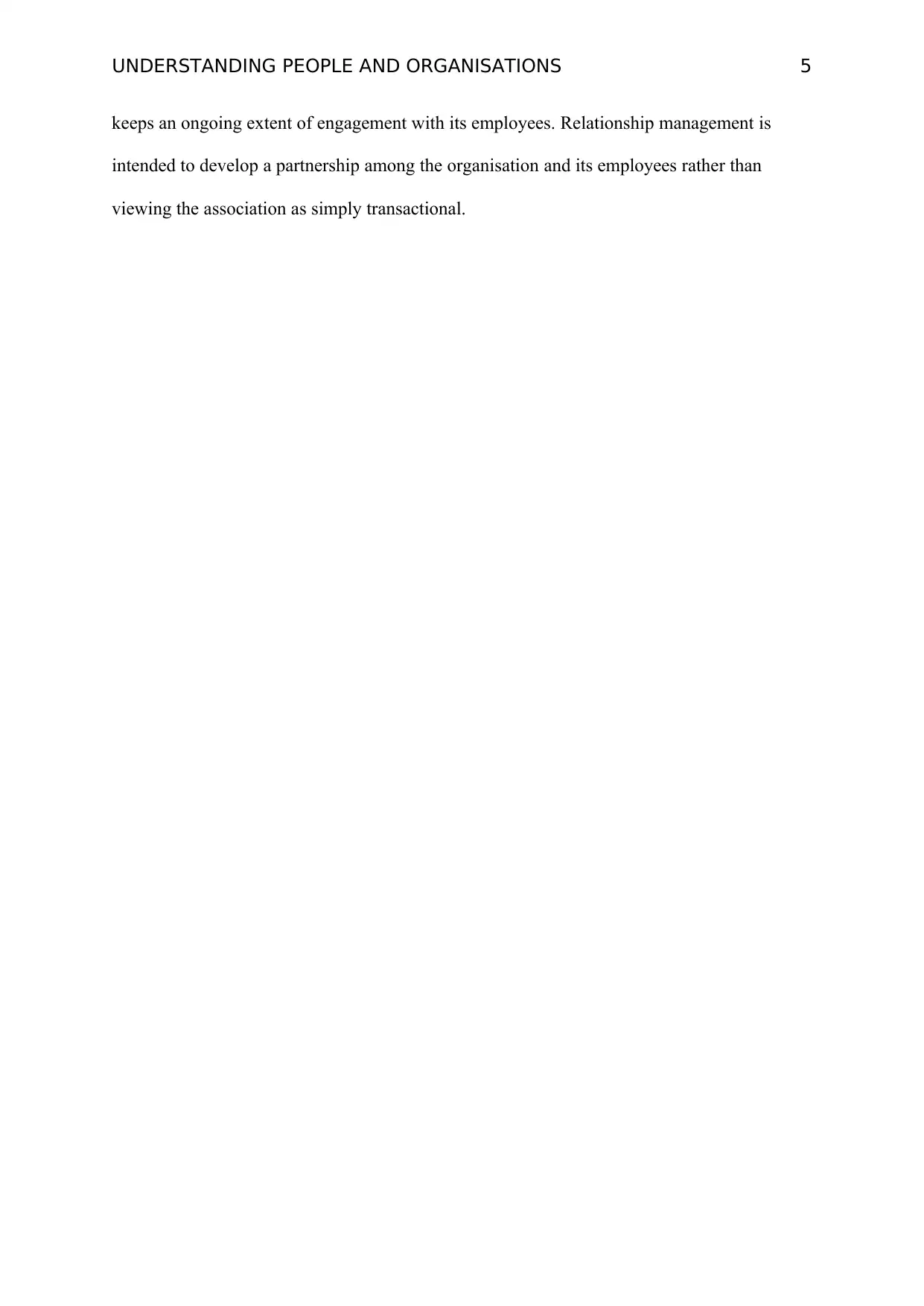
UNDERSTANDING PEOPLE AND ORGANISATIONS 5
keeps an ongoing extent of engagement with its employees. Relationship management is
intended to develop a partnership among the organisation and its employees rather than
viewing the association as simply transactional.
keeps an ongoing extent of engagement with its employees. Relationship management is
intended to develop a partnership among the organisation and its employees rather than
viewing the association as simply transactional.
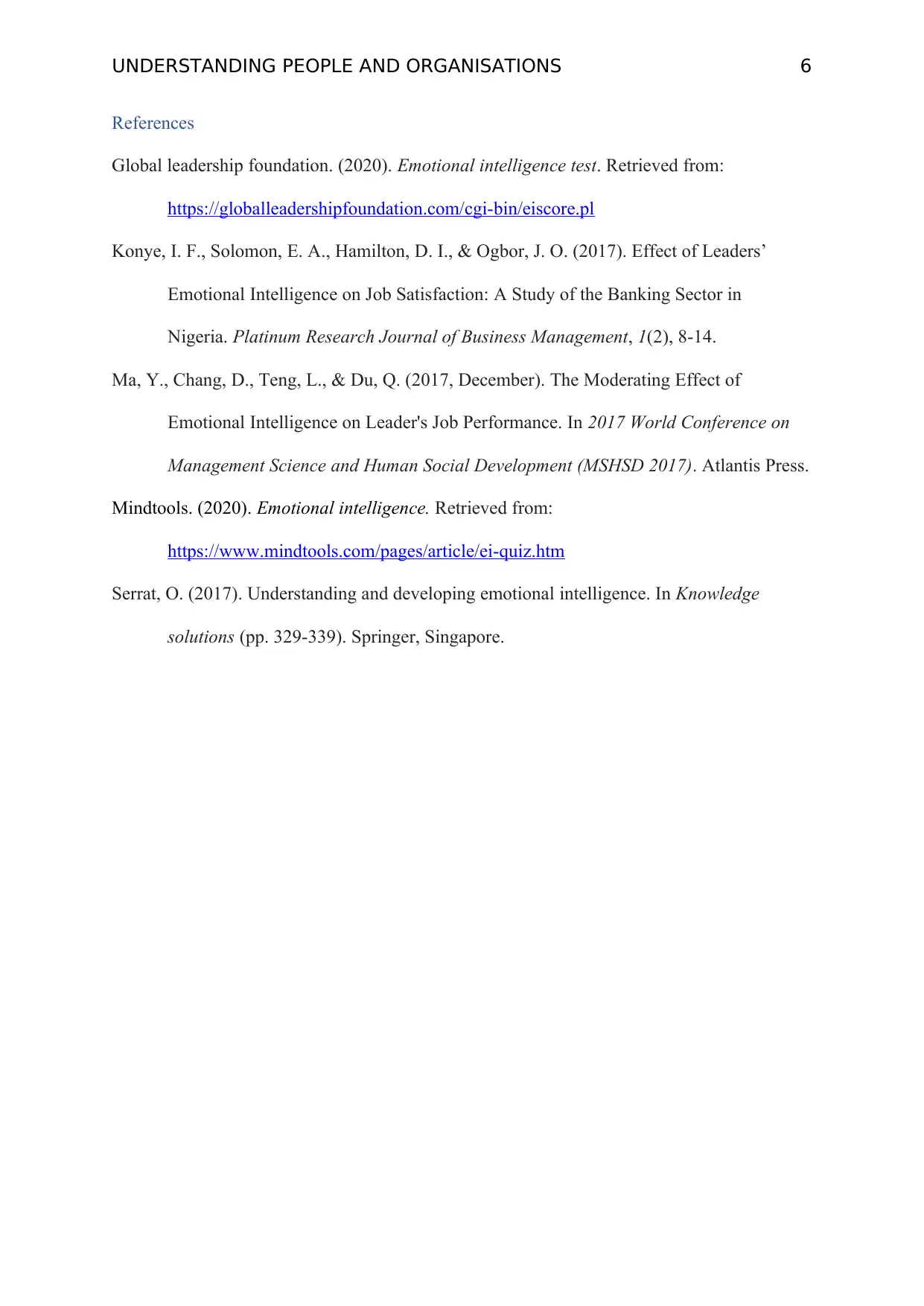
UNDERSTANDING PEOPLE AND ORGANISATIONS 6
References
Global leadership foundation. (2020). Emotional intelligence test. Retrieved from:
https://globalleadershipfoundation.com/cgi-bin/eiscore.pl
Konye, I. F., Solomon, E. A., Hamilton, D. I., & Ogbor, J. O. (2017). Effect of Leaders’
Emotional Intelligence on Job Satisfaction: A Study of the Banking Sector in
Nigeria. Platinum Research Journal of Business Management, 1(2), 8-14.
Ma, Y., Chang, D., Teng, L., & Du, Q. (2017, December). The Moderating Effect of
Emotional Intelligence on Leader's Job Performance. In 2017 World Conference on
Management Science and Human Social Development (MSHSD 2017). Atlantis Press.
Mindtools. (2020). Emotional intelligence. Retrieved from:
https://www.mindtools.com/pages/article/ei-quiz.htm
Serrat, O. (2017). Understanding and developing emotional intelligence. In Knowledge
solutions (pp. 329-339). Springer, Singapore.
References
Global leadership foundation. (2020). Emotional intelligence test. Retrieved from:
https://globalleadershipfoundation.com/cgi-bin/eiscore.pl
Konye, I. F., Solomon, E. A., Hamilton, D. I., & Ogbor, J. O. (2017). Effect of Leaders’
Emotional Intelligence on Job Satisfaction: A Study of the Banking Sector in
Nigeria. Platinum Research Journal of Business Management, 1(2), 8-14.
Ma, Y., Chang, D., Teng, L., & Du, Q. (2017, December). The Moderating Effect of
Emotional Intelligence on Leader's Job Performance. In 2017 World Conference on
Management Science and Human Social Development (MSHSD 2017). Atlantis Press.
Mindtools. (2020). Emotional intelligence. Retrieved from:
https://www.mindtools.com/pages/article/ei-quiz.htm
Serrat, O. (2017). Understanding and developing emotional intelligence. In Knowledge
solutions (pp. 329-339). Springer, Singapore.
⊘ This is a preview!⊘
Do you want full access?
Subscribe today to unlock all pages.

Trusted by 1+ million students worldwide
1 out of 6
Related Documents
Your All-in-One AI-Powered Toolkit for Academic Success.
+13062052269
info@desklib.com
Available 24*7 on WhatsApp / Email
![[object Object]](/_next/static/media/star-bottom.7253800d.svg)
Unlock your academic potential
Copyright © 2020–2026 A2Z Services. All Rights Reserved. Developed and managed by ZUCOL.





